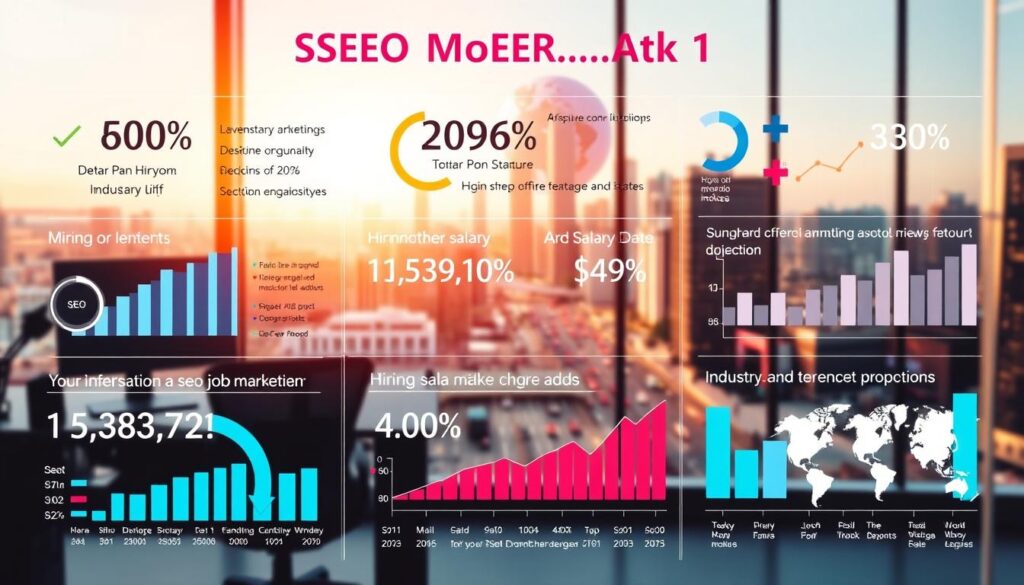Businesses today need to stand out online more than ever. With millions of websites competing for attention, professionals who understand search engine optimization play a critical role. This guide explores why these experts are vital and how they shape modern digital marketing strategies.
Since the late 1990s, optimizing for search engines has evolved from basic keyword stuffing to a sophisticated discipline. Today, skilled practitioners use data-driven tactics to improve website rankings on platforms like Google and Bing. Their work helps businesses attract organic traffic, build credibility, and drive growth.
Career paths in this field offer flexibility. Many professionals work in-house for brands, join agencies, or freelance for diverse clients. The rise of remote work has further expanded opportunities, making it easier to balance projects across industries.
As digital marketing grows, companies increasingly rely on technical and creative strategies to stay visible online. This guide will break down the skills required, emerging trends, and steps to start a successful career in this dynamic field.
Key Takeaways
- High demand exists for experts skilled in search engine optimization.
- Modern SEO focuses on data analysis and user experience.
- Professionals can choose agency, corporate, or freelance roles.
- Technical and creative skills are equally important for success.
- Industry growth reflects the importance of online visibility.
Introduction to SEO and Its Growing Importance
In a world where digital presence dictates success, mastering search visibility is non-negotiable. Companies that rank higher on search engines gain more clicks, trust, and revenue. This section breaks down how engine optimization works and why it’s reshaping how businesses connect with audiences.
What Is SEO and Why It Matters
Search engine optimization (SEO) involves tailoring websites to meet platform guidelines like Google’s. Over 53% of website traffic comes from organic searches, making it a cornerstone of digital marketing. By aligning content with user intent, businesses improve rankings without paid ads.
Modern strategies go beyond keywords. They focus on technical speed, mobile compatibility, and content quality. For example, pages loading in 2 seconds see 9% higher retention than slower ones.
Historical Evolution and Current Trends
Early SEO in the 1990s relied on repetitive keywords. Today, algorithms prioritize relevance and expertise. Google’s 2022 Helpful Content Update rewards pages that answer questions thoroughly.
| Aspect | 1990s Approach | 2020s Approach |
|---|---|---|
| Keywords | Exact-match stuffing | Semantic context |
| Technical Focus | Meta tags only | Site speed, mobile-first design |
| User Experience | Not prioritized | Core Web Vitals metrics |
Staying updated is critical for a career in this field. Professionals now use AI tools to predict trends and analyze competitors. This adaptability keeps brands visible amid shifting algorithms.
The Role and Responsibilities of an SEO Specialist
Navigating the digital landscape requires a unique blend of creativity and technical expertise. Professionals in this field balance data analysis with strategic thinking to boost website performance. Their work bridges gaps between technical teams and creative campaigns, ensuring brands stay visible in crowded markets.
Daily Tasks and Strategic Duties
A typical day involves keyword research using tools like Ahrefs or SEMrush. These insights shape content plans and meta tag adjustments. For example, updating title tags with high-value phrases can lift rankings by 15% in competitive niches.
Analytics platforms like Google Search Console track traffic patterns. Specialists review bounce rates, click-through data, and conversion paths weekly. Adjustments happen fast—shifting focus to trending topics or fixing crawl errors within hours.
| Daily Focus | Long-Term Strategy |
|---|---|
| Keyword tracking | Content calendar development |
| Backlink audits | Technical infrastructure upgrades |
| Competitor gap analysis | Algorithm change preparedness |
Collaborating with Digital Marketing Teams
Success hinges on teamwork. Weekly syncs with content creators ensure articles align with search intent. Developers receive prioritized lists for site speed improvements, while social media teams share insights on trending topics.
This role thrives on adaptability. When Google’s Core Web Vitals rolled out, specialists partnered with designers to overhaul navigation structures. Such cross-functional efforts keep campaigns agile and results-driven.
Are SEO Specialists In Demand? Evaluating Job Market Trends
The digital economy’s expansion fuels urgent needs for expertise in search visibility. Over 75% of companies now prioritize hiring professionals skilled in organic growth strategies. Glassdoor reports average U.S. salaries exceeding $75,000 annually, reflecting the value placed on these roles.

Industries from healthcare to retail rely on tailored optimization approaches. For example, e-commerce brands improved revenue by 34% after refining product page metadata. Local service businesses saw 50% more inquiries through localized keyword targeting.
| Industry | Key SEO Focus | Result |
|---|---|---|
| E-commerce | Product schema markup | +28% click-through rates |
| Healthcare | Voice search optimization | +40% appointment bookings |
| Education | Long-form content | Tripled organic traffic |
| Finance | Featured snippet targeting | +22% lead generation |
Analytics mastery drives this demand. Brands using AI-powered tools like BrightEdge achieve 3x faster ranking improvements. As voice searches and video content grow, adaptable strategies will define market leaders.
Career stability remains strong—LinkedIn lists these roles among the top 10 fastest-growing in tech. With 500 million websites competing globally, visibility experts won’t face shortages soon.
Essential Skills and Certifications for SEO Professionals
Success in digital marketing hinges on mastering both technical precision and creative problem-solving. Professionals must adapt to evolving search engine standards while delivering measurable results for businesses. Let’s explore the core competencies that set top performers apart.
Technical Know-How and Analytical Skills
Understanding website infrastructure is non-negotiable. Familiarity with HTML tags helps optimize meta descriptions, while CSS knowledge ensures mobile-friendly designs. Tools like Screaming Frog or Google Search Console identify crawl errors slowing down websites.
Analytical abilities turn data into action. Tracking metrics like bounce rates or keyword rankings reveals patterns. For example, pages with low engagement might need clearer calls-to-action or faster load times. This skill set bridges gaps between raw numbers and strategic improvements.
Certification Paths and Continuous Learning
Credentials validate expertise in a competitive industry. HubSpot Academy’s SEO Certification covers on-page tactics, while Semrush Academy teaches advanced keyword research. Google’s Analytics IQ certification remains a gold standard for interpreting user behavior.
Staying updated matters. Algorithm changes from search engines require quarterly training. Many professionals join forums like Moz Q&A or attend virtual summits to exchange strategies. Blending formal education with hands-on experience creates adaptable experts ready for shifting demands.
Diverse Career Paths in SEO
The digital landscape offers multiple roads for growth, whether you enjoy crunching data or crafting compelling stories. Professionals can shape their journey based on strengths, from technical troubleshooting to creative campaign design.

From Entry-Level to Specialized Roles
Starting as an SEO Executive, newcomers learn keyword research and basic analytics. Within 2-3 years, many advance to Analyst roles, interpreting traffic patterns and optimizing content strategies. Top performers often transition into consultancy, guiding multiple clients on ranking improvements.
Leadership positions like Manager or Digital Marketing Director require broader vision. These roles oversee teams, allocate budgets, and align strategies with company goals. Glassdoor data shows managerial salaries often exceed $95,000 annually in tech hubs.
Specialization opens unique doors. Technical experts focus on site architecture audits, while content strategists develop viral blog series. Voice search optimization and AI-driven tools represent emerging niches with high earning potential.
Staying relevant means continuous learning. Monthly research into algorithm updates ensures tactics remain effective. Platforms like Coursera report 67% of professionals take yearly courses to master new trends.
Success hinges on balancing hard skills with adaptability. Those who track rankings while experimenting with fresh approaches often climb fastest in this ever-changing field.
Effective Tools and Strategies in SEO
Mastering modern search visibility requires combining cutting-edge tools with adaptable strategies. Professionals rely on precise data and creative problem-solving to navigate evolving algorithms. Let’s explore the resources and methods driving results today.

Leveraging Analytics and SEO Tools
Platforms like Google Analytics and SEMrush transform raw numbers into actionable insights. These tools track keyword rankings, backlink quality, and user behavior patterns. For example, Ahrefs’ Site Audit feature identifies 90% of technical issues within minutes.
| Tool | Primary Use | Impact |
|---|---|---|
| Google Search Console | Indexing health checks | +30% crawl efficiency |
| SEMrush | Competitor analysis | 50% faster strategy adjustments |
| Screaming Frog | Site structure audits | Reduces broken links by 75% |
On-Page, Off-Page, and Technical Optimization
Balancing these three pillars maximizes visibility. On-page tactics include optimizing title tags and internal linking structures. Technical upgrades like schema markup help search engines understand content context.
- Mobile-first design boosts engagement by 40%
- Compressing images improves page speed by 3 seconds
- Secure HTTPS connections increase trust signals
Innovative Link-Building and Content Strategies
Creative outreach remains crucial. A travel brand recently doubled organic traffic by partnering with eco-conscious influencers for guest posts. Video tutorials with embedded transcripts also perform well, capturing both search and video results.
Successful teams treat content as living assets. Updating old posts with fresh statistics and interactive elements keeps them relevant. This approach led a finance blog to triple its featured snippet appearances in six months.
Practical Tips to Advance Your SEO Career
Building a thriving career in search optimization starts with real-world practice. While certifications matter, employers value tangible results. Start by auditing local business websites or volunteering for nonprofits—these projects showcase problem-solving skills and attention to detail.
Gaining Hands-On Experience in the Field
Freelance platforms like Upwork offer entry-level gigs to hone technical SEO skills. Tackle tasks such as fixing broken links or optimizing meta tags. Track improvements using tools like Google Search Console to demonstrate measurable impact.
Internships at digital agencies provide structured learning. You’ll collaborate on client campaigns, analyze traffic patterns, and implement successful SEO strategies. Document these experiences in a portfolio with before-and-after metrics.
| Skill Level | Focus Area | Key Actions |
|---|---|---|
| Beginner | Keyword Research | Master tools like AnswerThePublic |
| Intermediate | Technical Audits | Fix crawl errors using Screaming Frog |
| Advanced | Strategy Leadership | Design A/B tests for landing pages |
Attend workshops hosted by platforms like Google Analytics Academy. These events reveal algorithm updates and emerging tactics. Networking at conferences often leads to mentorship opportunities with seasoned SEO manager professionals.
Consistently update your knowledge base. Platforms like Coursera offer courses on voice search optimization and AI-driven analytics. Over time, this dedication positions you for leadership roles focused on online visibility and sustainable growth.
Conclusion
Success in the digital age requires more than just a website. Organizations now recognize that strategic search visibility separates industry leaders from competitors. This growing field blends technical precision with creative problem-solving, offering diverse paths for those ready to adapt.
Tools like Google Analytics empower professionals to track progress and refine tactics effectively. Regular audits and data-driven adjustments keep brands ahead in shifting algorithms. Pairing these insights with fresh content strategies builds lasting organic growth.
Continuous education remains vital in this fast-moving field. Certifications and hands-on projects keep skills sharp while exploring emerging trends like voice search optimization. Career paths adapt to individual strengths—whether leading teams or shaping technical infrastructure.
Ready to make an impact? Explore advanced training programs and start building measurable results today. The digital landscape rewards those who combine curiosity with actionable expertise.
